Critical Analysis: Acute Decompensated Heart Failure & COPD Case
VerifiedAdded on 2022/09/14
|6
|1747
|13
Case Study
AI Summary
This case study focuses on Mrs. J, a 63-year-old woman with a history of hypertension, chronic heart failure, and COPD, who is admitted to the ICU with acute decompensated heart failure and an acute exacerbation of COPD. The solution details the pathophysiological processes of both conditions, including the activation of the neurohormonal pathway in heart failure and the increase in inflammatory mediators in COPD. It discusses the appropriateness of the nursing interventions, including the administration of Furosemide, Enalapril, Metoprolol, Morphine, short-acting bronchodilators, and corticosteroids, along with oxygen administration. The case study also covers preventative measures for heart failure related to hypertension, coronary heart disease, and heart attack, and addresses the risks of polypharmacy in elderly patients and the nurse's role in mitigating drug interactions. Finally, it outlines a cardiac rehabilitation program for Mrs. J, teaching methods for older adults, and triggers of COPD exacerbations, emphasizing the importance of smoking cessation.

Nursing
Student’s name:
Institutional:
Student’s name:
Institutional:
Paraphrase This Document
Need a fresh take? Get an instant paraphrase of this document with our AI Paraphraser
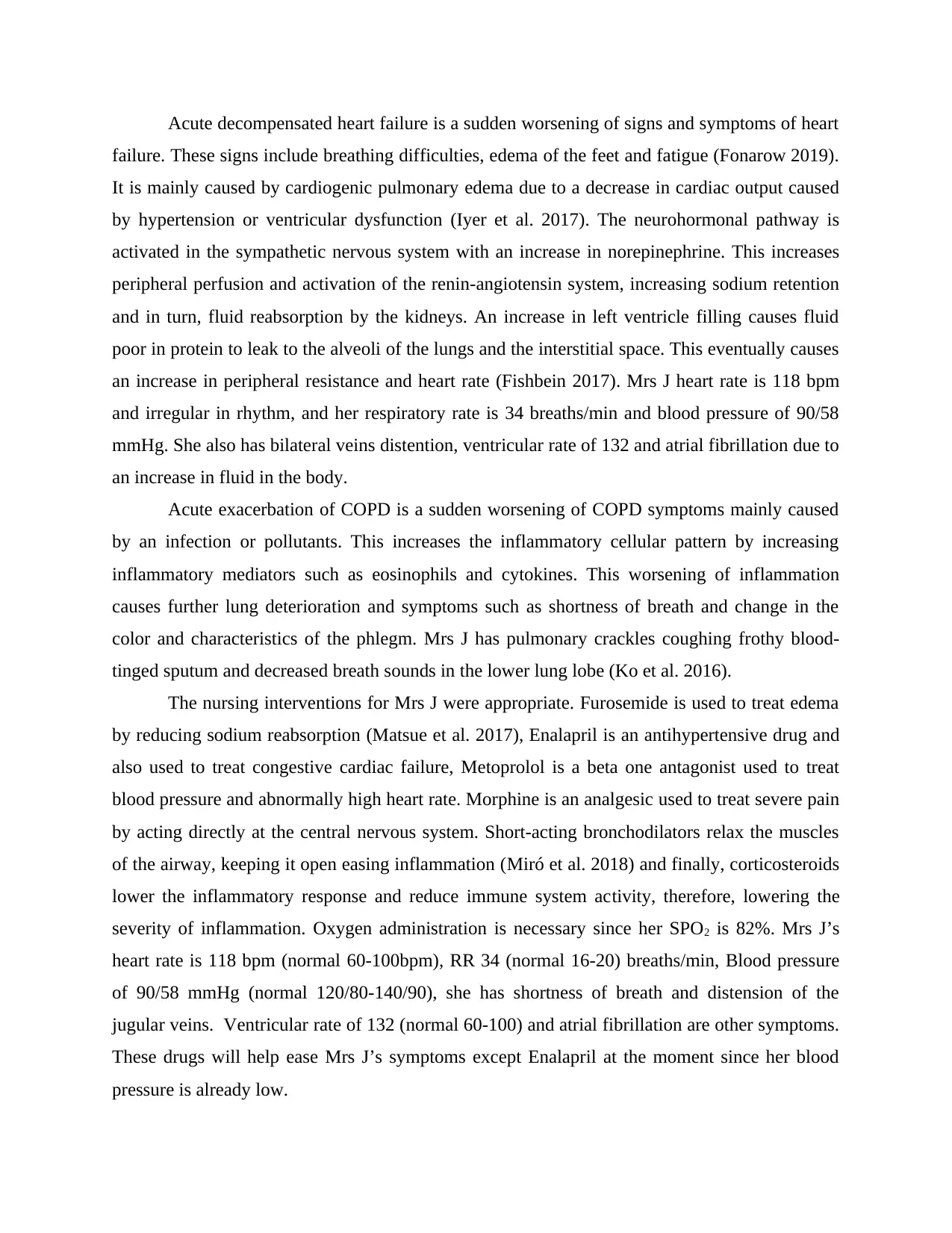
Acute decompensated heart failure is a sudden worsening of signs and symptoms of heart
failure. These signs include breathing difficulties, edema of the feet and fatigue (Fonarow 2019).
It is mainly caused by cardiogenic pulmonary edema due to a decrease in cardiac output caused
by hypertension or ventricular dysfunction (Iyer et al. 2017). The neurohormonal pathway is
activated in the sympathetic nervous system with an increase in norepinephrine. This increases
peripheral perfusion and activation of the renin-angiotensin system, increasing sodium retention
and in turn, fluid reabsorption by the kidneys. An increase in left ventricle filling causes fluid
poor in protein to leak to the alveoli of the lungs and the interstitial space. This eventually causes
an increase in peripheral resistance and heart rate (Fishbein 2017). Mrs J heart rate is 118 bpm
and irregular in rhythm, and her respiratory rate is 34 breaths/min and blood pressure of 90/58
mmHg. She also has bilateral veins distention, ventricular rate of 132 and atrial fibrillation due to
an increase in fluid in the body.
Acute exacerbation of COPD is a sudden worsening of COPD symptoms mainly caused
by an infection or pollutants. This increases the inflammatory cellular pattern by increasing
inflammatory mediators such as eosinophils and cytokines. This worsening of inflammation
causes further lung deterioration and symptoms such as shortness of breath and change in the
color and characteristics of the phlegm. Mrs J has pulmonary crackles coughing frothy blood-
tinged sputum and decreased breath sounds in the lower lung lobe (Ko et al. 2016).
The nursing interventions for Mrs J were appropriate. Furosemide is used to treat edema
by reducing sodium reabsorption (Matsue et al. 2017), Enalapril is an antihypertensive drug and
also used to treat congestive cardiac failure, Metoprolol is a beta one antagonist used to treat
blood pressure and abnormally high heart rate. Morphine is an analgesic used to treat severe pain
by acting directly at the central nervous system. Short-acting bronchodilators relax the muscles
of the airway, keeping it open easing inflammation (Miró et al. 2018) and finally, corticosteroids
lower the inflammatory response and reduce immune system activity, therefore, lowering the
severity of inflammation. Oxygen administration is necessary since her SPO2 is 82%. Mrs J’s
heart rate is 118 bpm (normal 60-100bpm), RR 34 (normal 16-20) breaths/min, Blood pressure
of 90/58 mmHg (normal 120/80-140/90), she has shortness of breath and distension of the
jugular veins. Ventricular rate of 132 (normal 60-100) and atrial fibrillation are other symptoms.
These drugs will help ease Mrs J’s symptoms except Enalapril at the moment since her blood
pressure is already low.
failure. These signs include breathing difficulties, edema of the feet and fatigue (Fonarow 2019).
It is mainly caused by cardiogenic pulmonary edema due to a decrease in cardiac output caused
by hypertension or ventricular dysfunction (Iyer et al. 2017). The neurohormonal pathway is
activated in the sympathetic nervous system with an increase in norepinephrine. This increases
peripheral perfusion and activation of the renin-angiotensin system, increasing sodium retention
and in turn, fluid reabsorption by the kidneys. An increase in left ventricle filling causes fluid
poor in protein to leak to the alveoli of the lungs and the interstitial space. This eventually causes
an increase in peripheral resistance and heart rate (Fishbein 2017). Mrs J heart rate is 118 bpm
and irregular in rhythm, and her respiratory rate is 34 breaths/min and blood pressure of 90/58
mmHg. She also has bilateral veins distention, ventricular rate of 132 and atrial fibrillation due to
an increase in fluid in the body.
Acute exacerbation of COPD is a sudden worsening of COPD symptoms mainly caused
by an infection or pollutants. This increases the inflammatory cellular pattern by increasing
inflammatory mediators such as eosinophils and cytokines. This worsening of inflammation
causes further lung deterioration and symptoms such as shortness of breath and change in the
color and characteristics of the phlegm. Mrs J has pulmonary crackles coughing frothy blood-
tinged sputum and decreased breath sounds in the lower lung lobe (Ko et al. 2016).
The nursing interventions for Mrs J were appropriate. Furosemide is used to treat edema
by reducing sodium reabsorption (Matsue et al. 2017), Enalapril is an antihypertensive drug and
also used to treat congestive cardiac failure, Metoprolol is a beta one antagonist used to treat
blood pressure and abnormally high heart rate. Morphine is an analgesic used to treat severe pain
by acting directly at the central nervous system. Short-acting bronchodilators relax the muscles
of the airway, keeping it open easing inflammation (Miró et al. 2018) and finally, corticosteroids
lower the inflammatory response and reduce immune system activity, therefore, lowering the
severity of inflammation. Oxygen administration is necessary since her SPO2 is 82%. Mrs J’s
heart rate is 118 bpm (normal 60-100bpm), RR 34 (normal 16-20) breaths/min, Blood pressure
of 90/58 mmHg (normal 120/80-140/90), she has shortness of breath and distension of the
jugular veins. Ventricular rate of 132 (normal 60-100) and atrial fibrillation are other symptoms.
These drugs will help ease Mrs J’s symptoms except Enalapril at the moment since her blood
pressure is already low.
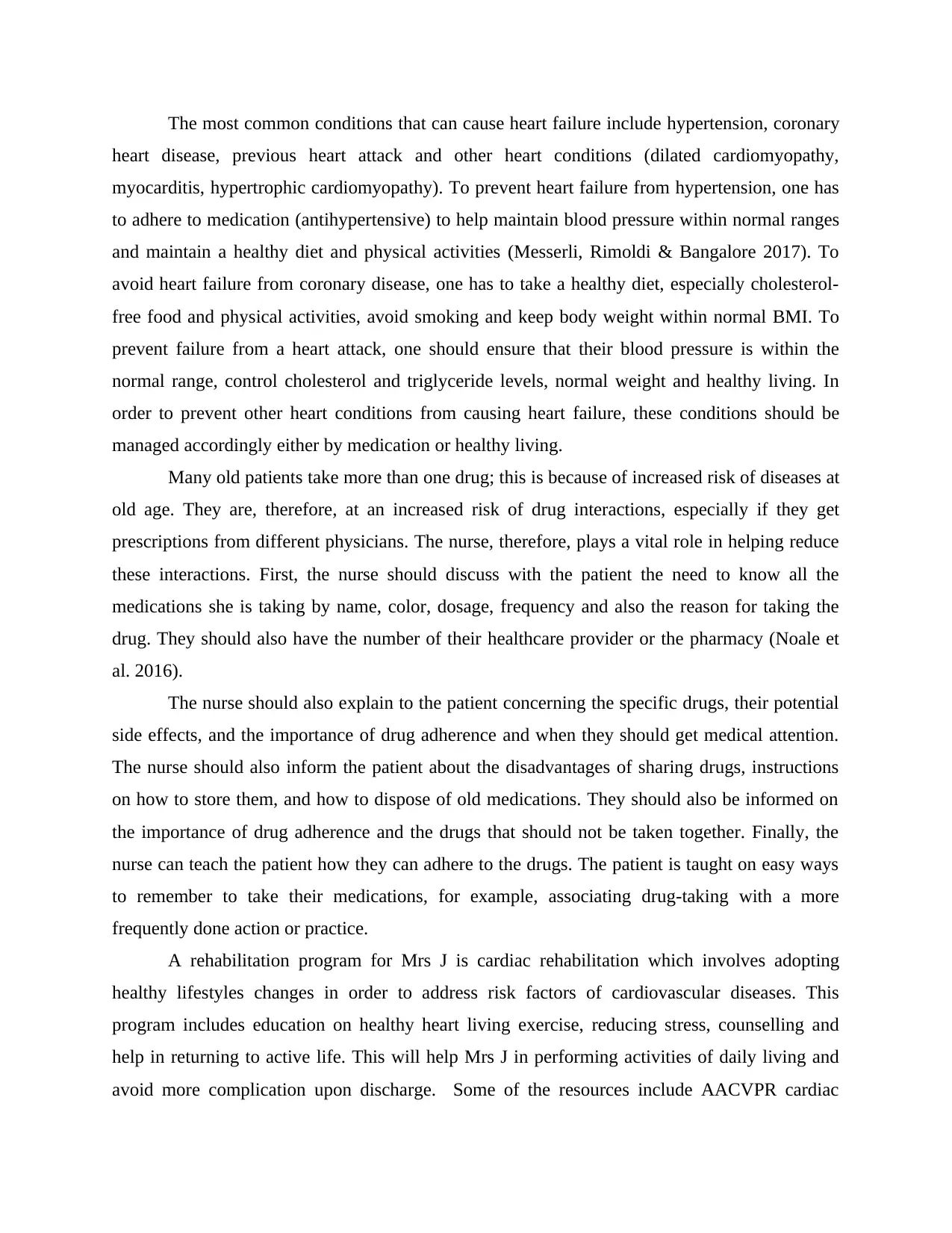
The most common conditions that can cause heart failure include hypertension, coronary
heart disease, previous heart attack and other heart conditions (dilated cardiomyopathy,
myocarditis, hypertrophic cardiomyopathy). To prevent heart failure from hypertension, one has
to adhere to medication (antihypertensive) to help maintain blood pressure within normal ranges
and maintain a healthy diet and physical activities (Messerli, Rimoldi & Bangalore 2017). To
avoid heart failure from coronary disease, one has to take a healthy diet, especially cholesterol-
free food and physical activities, avoid smoking and keep body weight within normal BMI. To
prevent failure from a heart attack, one should ensure that their blood pressure is within the
normal range, control cholesterol and triglyceride levels, normal weight and healthy living. In
order to prevent other heart conditions from causing heart failure, these conditions should be
managed accordingly either by medication or healthy living.
Many old patients take more than one drug; this is because of increased risk of diseases at
old age. They are, therefore, at an increased risk of drug interactions, especially if they get
prescriptions from different physicians. The nurse, therefore, plays a vital role in helping reduce
these interactions. First, the nurse should discuss with the patient the need to know all the
medications she is taking by name, color, dosage, frequency and also the reason for taking the
drug. They should also have the number of their healthcare provider or the pharmacy (Noale et
al. 2016).
The nurse should also explain to the patient concerning the specific drugs, their potential
side effects, and the importance of drug adherence and when they should get medical attention.
The nurse should also inform the patient about the disadvantages of sharing drugs, instructions
on how to store them, and how to dispose of old medications. They should also be informed on
the importance of drug adherence and the drugs that should not be taken together. Finally, the
nurse can teach the patient how they can adhere to the drugs. The patient is taught on easy ways
to remember to take their medications, for example, associating drug-taking with a more
frequently done action or practice.
A rehabilitation program for Mrs J is cardiac rehabilitation which involves adopting
healthy lifestyles changes in order to address risk factors of cardiovascular diseases. This
program includes education on healthy heart living exercise, reducing stress, counselling and
help in returning to active life. This will help Mrs J in performing activities of daily living and
avoid more complication upon discharge. Some of the resources include AACVPR cardiac
heart disease, previous heart attack and other heart conditions (dilated cardiomyopathy,
myocarditis, hypertrophic cardiomyopathy). To prevent heart failure from hypertension, one has
to adhere to medication (antihypertensive) to help maintain blood pressure within normal ranges
and maintain a healthy diet and physical activities (Messerli, Rimoldi & Bangalore 2017). To
avoid heart failure from coronary disease, one has to take a healthy diet, especially cholesterol-
free food and physical activities, avoid smoking and keep body weight within normal BMI. To
prevent failure from a heart attack, one should ensure that their blood pressure is within the
normal range, control cholesterol and triglyceride levels, normal weight and healthy living. In
order to prevent other heart conditions from causing heart failure, these conditions should be
managed accordingly either by medication or healthy living.
Many old patients take more than one drug; this is because of increased risk of diseases at
old age. They are, therefore, at an increased risk of drug interactions, especially if they get
prescriptions from different physicians. The nurse, therefore, plays a vital role in helping reduce
these interactions. First, the nurse should discuss with the patient the need to know all the
medications she is taking by name, color, dosage, frequency and also the reason for taking the
drug. They should also have the number of their healthcare provider or the pharmacy (Noale et
al. 2016).
The nurse should also explain to the patient concerning the specific drugs, their potential
side effects, and the importance of drug adherence and when they should get medical attention.
The nurse should also inform the patient about the disadvantages of sharing drugs, instructions
on how to store them, and how to dispose of old medications. They should also be informed on
the importance of drug adherence and the drugs that should not be taken together. Finally, the
nurse can teach the patient how they can adhere to the drugs. The patient is taught on easy ways
to remember to take their medications, for example, associating drug-taking with a more
frequently done action or practice.
A rehabilitation program for Mrs J is cardiac rehabilitation which involves adopting
healthy lifestyles changes in order to address risk factors of cardiovascular diseases. This
program includes education on healthy heart living exercise, reducing stress, counselling and
help in returning to active life. This will help Mrs J in performing activities of daily living and
avoid more complication upon discharge. Some of the resources include AACVPR cardiac
⊘ This is a preview!⊘
Do you want full access?
Subscribe today to unlock all pages.

Trusted by 1+ million students worldwide
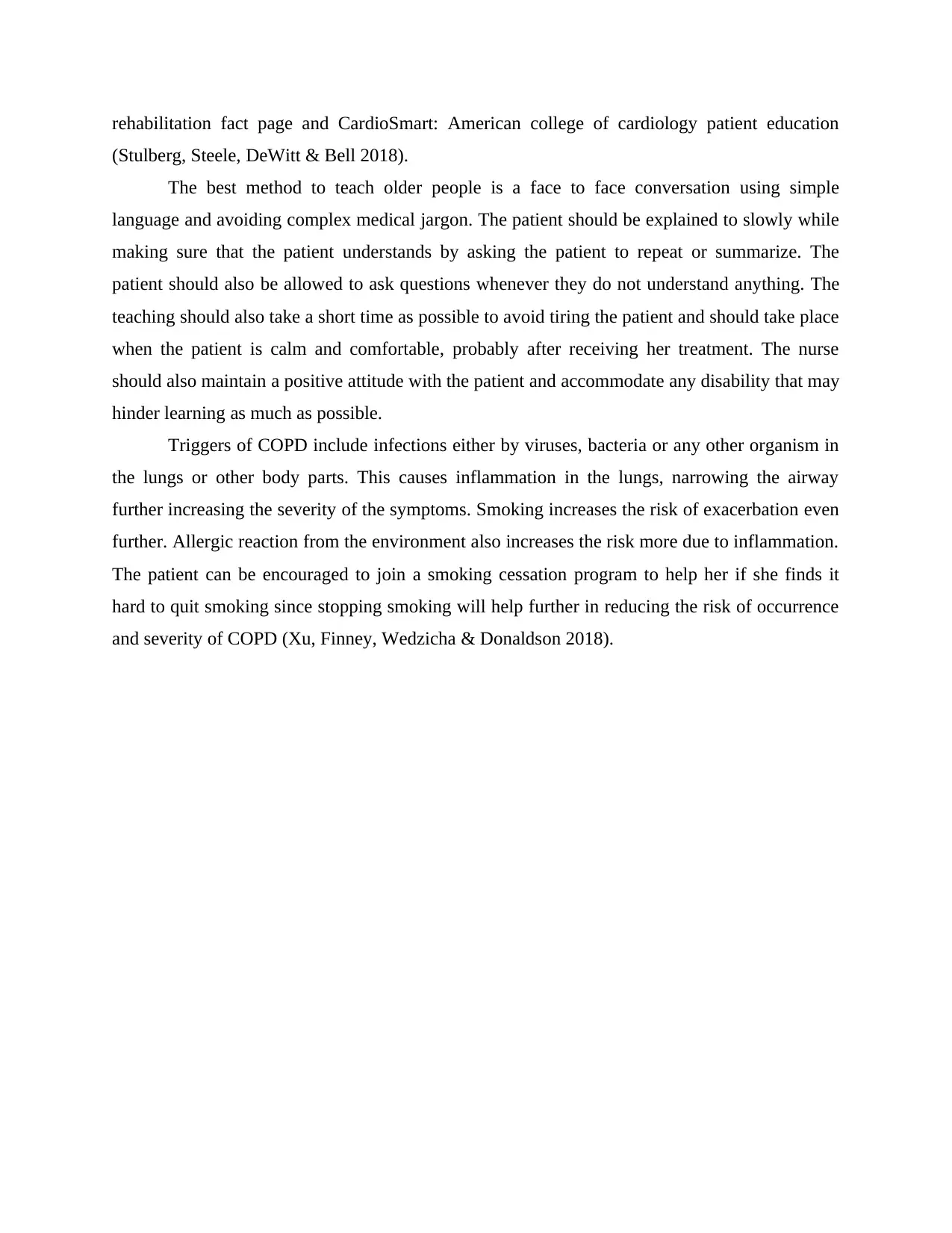
rehabilitation fact page and CardioSmart: American college of cardiology patient education
(Stulberg, Steele, DeWitt & Bell 2018).
The best method to teach older people is a face to face conversation using simple
language and avoiding complex medical jargon. The patient should be explained to slowly while
making sure that the patient understands by asking the patient to repeat or summarize. The
patient should also be allowed to ask questions whenever they do not understand anything. The
teaching should also take a short time as possible to avoid tiring the patient and should take place
when the patient is calm and comfortable, probably after receiving her treatment. The nurse
should also maintain a positive attitude with the patient and accommodate any disability that may
hinder learning as much as possible.
Triggers of COPD include infections either by viruses, bacteria or any other organism in
the lungs or other body parts. This causes inflammation in the lungs, narrowing the airway
further increasing the severity of the symptoms. Smoking increases the risk of exacerbation even
further. Allergic reaction from the environment also increases the risk more due to inflammation.
The patient can be encouraged to join a smoking cessation program to help her if she finds it
hard to quit smoking since stopping smoking will help further in reducing the risk of occurrence
and severity of COPD (Xu, Finney, Wedzicha & Donaldson 2018).
(Stulberg, Steele, DeWitt & Bell 2018).
The best method to teach older people is a face to face conversation using simple
language and avoiding complex medical jargon. The patient should be explained to slowly while
making sure that the patient understands by asking the patient to repeat or summarize. The
patient should also be allowed to ask questions whenever they do not understand anything. The
teaching should also take a short time as possible to avoid tiring the patient and should take place
when the patient is calm and comfortable, probably after receiving her treatment. The nurse
should also maintain a positive attitude with the patient and accommodate any disability that may
hinder learning as much as possible.
Triggers of COPD include infections either by viruses, bacteria or any other organism in
the lungs or other body parts. This causes inflammation in the lungs, narrowing the airway
further increasing the severity of the symptoms. Smoking increases the risk of exacerbation even
further. Allergic reaction from the environment also increases the risk more due to inflammation.
The patient can be encouraged to join a smoking cessation program to help her if she finds it
hard to quit smoking since stopping smoking will help further in reducing the risk of occurrence
and severity of COPD (Xu, Finney, Wedzicha & Donaldson 2018).
Paraphrase This Document
Need a fresh take? Get an instant paraphrase of this document with our AI Paraphraser
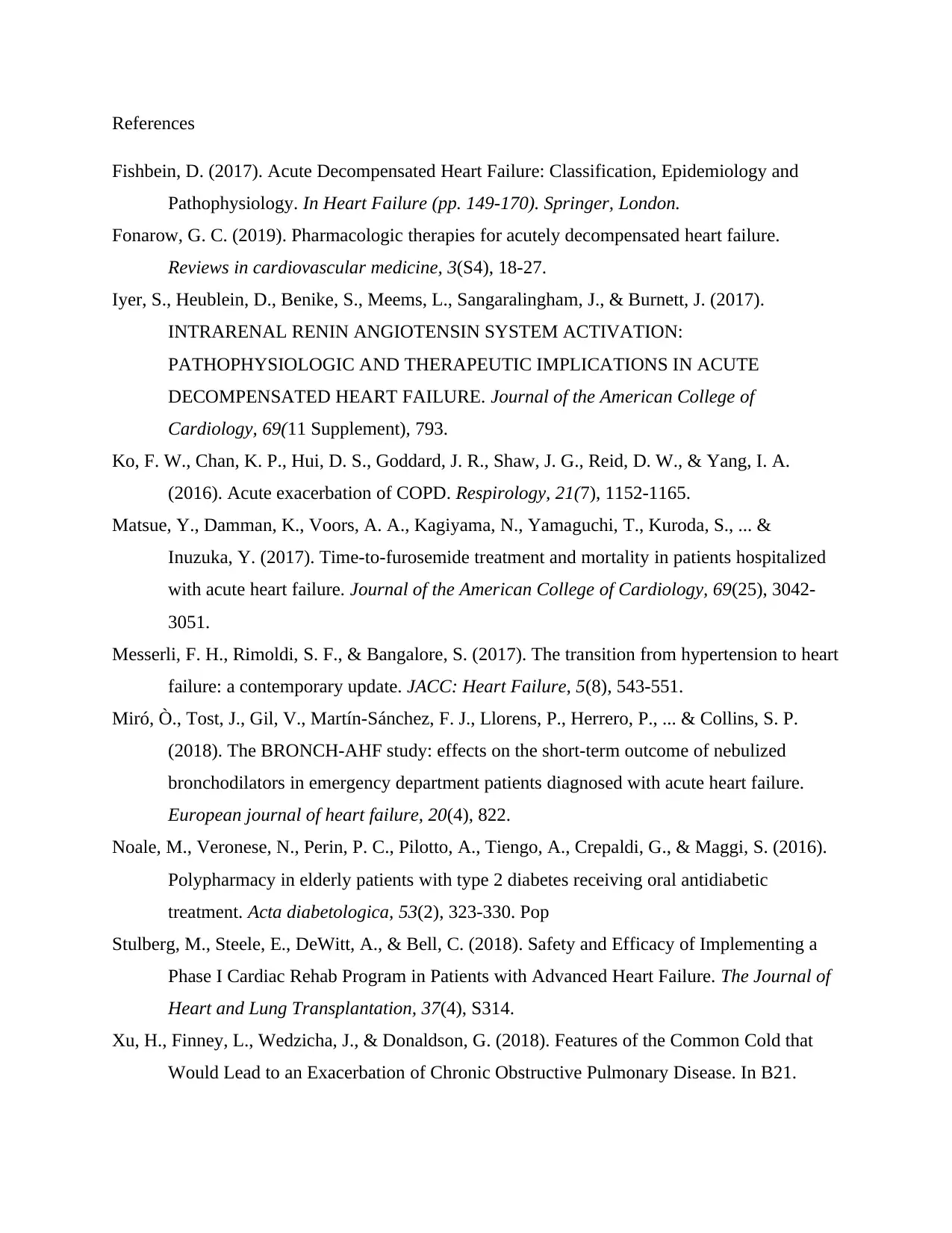
References
Fishbein, D. (2017). Acute Decompensated Heart Failure: Classification, Epidemiology and
Pathophysiology. In Heart Failure (pp. 149-170). Springer, London.
Fonarow, G. C. (2019). Pharmacologic therapies for acutely decompensated heart failure.
Reviews in cardiovascular medicine, 3(S4), 18-27.
Iyer, S., Heublein, D., Benike, S., Meems, L., Sangaralingham, J., & Burnett, J. (2017).
INTRARENAL RENIN ANGIOTENSIN SYSTEM ACTIVATION:
PATHOPHYSIOLOGIC AND THERAPEUTIC IMPLICATIONS IN ACUTE
DECOMPENSATED HEART FAILURE. Journal of the American College of
Cardiology, 69(11 Supplement), 793.
Ko, F. W., Chan, K. P., Hui, D. S., Goddard, J. R., Shaw, J. G., Reid, D. W., & Yang, I. A.
(2016). Acute exacerbation of COPD. Respirology, 21(7), 1152-1165.
Matsue, Y., Damman, K., Voors, A. A., Kagiyama, N., Yamaguchi, T., Kuroda, S., ... &
Inuzuka, Y. (2017). Time-to-furosemide treatment and mortality in patients hospitalized
with acute heart failure. Journal of the American College of Cardiology, 69(25), 3042-
3051.
Messerli, F. H., Rimoldi, S. F., & Bangalore, S. (2017). The transition from hypertension to heart
failure: a contemporary update. JACC: Heart Failure, 5(8), 543-551.
Miró, Ò., Tost, J., Gil, V., Martín-Sánchez, F. J., Llorens, P., Herrero, P., ... & Collins, S. P.
(2018). The BRONCH-AHF study: effects on the short-term outcome of nebulized
bronchodilators in emergency department patients diagnosed with acute heart failure.
European journal of heart failure, 20(4), 822.
Noale, M., Veronese, N., Perin, P. C., Pilotto, A., Tiengo, A., Crepaldi, G., & Maggi, S. (2016).
Polypharmacy in elderly patients with type 2 diabetes receiving oral antidiabetic
treatment. Acta diabetologica, 53(2), 323-330. Pop
Stulberg, M., Steele, E., DeWitt, A., & Bell, C. (2018). Safety and Efficacy of Implementing a
Phase I Cardiac Rehab Program in Patients with Advanced Heart Failure. The Journal of
Heart and Lung Transplantation, 37(4), S314.
Xu, H., Finney, L., Wedzicha, J., & Donaldson, G. (2018). Features of the Common Cold that
Would Lead to an Exacerbation of Chronic Obstructive Pulmonary Disease. In B21.
Fishbein, D. (2017). Acute Decompensated Heart Failure: Classification, Epidemiology and
Pathophysiology. In Heart Failure (pp. 149-170). Springer, London.
Fonarow, G. C. (2019). Pharmacologic therapies for acutely decompensated heart failure.
Reviews in cardiovascular medicine, 3(S4), 18-27.
Iyer, S., Heublein, D., Benike, S., Meems, L., Sangaralingham, J., & Burnett, J. (2017).
INTRARENAL RENIN ANGIOTENSIN SYSTEM ACTIVATION:
PATHOPHYSIOLOGIC AND THERAPEUTIC IMPLICATIONS IN ACUTE
DECOMPENSATED HEART FAILURE. Journal of the American College of
Cardiology, 69(11 Supplement), 793.
Ko, F. W., Chan, K. P., Hui, D. S., Goddard, J. R., Shaw, J. G., Reid, D. W., & Yang, I. A.
(2016). Acute exacerbation of COPD. Respirology, 21(7), 1152-1165.
Matsue, Y., Damman, K., Voors, A. A., Kagiyama, N., Yamaguchi, T., Kuroda, S., ... &
Inuzuka, Y. (2017). Time-to-furosemide treatment and mortality in patients hospitalized
with acute heart failure. Journal of the American College of Cardiology, 69(25), 3042-
3051.
Messerli, F. H., Rimoldi, S. F., & Bangalore, S. (2017). The transition from hypertension to heart
failure: a contemporary update. JACC: Heart Failure, 5(8), 543-551.
Miró, Ò., Tost, J., Gil, V., Martín-Sánchez, F. J., Llorens, P., Herrero, P., ... & Collins, S. P.
(2018). The BRONCH-AHF study: effects on the short-term outcome of nebulized
bronchodilators in emergency department patients diagnosed with acute heart failure.
European journal of heart failure, 20(4), 822.
Noale, M., Veronese, N., Perin, P. C., Pilotto, A., Tiengo, A., Crepaldi, G., & Maggi, S. (2016).
Polypharmacy in elderly patients with type 2 diabetes receiving oral antidiabetic
treatment. Acta diabetologica, 53(2), 323-330. Pop
Stulberg, M., Steele, E., DeWitt, A., & Bell, C. (2018). Safety and Efficacy of Implementing a
Phase I Cardiac Rehab Program in Patients with Advanced Heart Failure. The Journal of
Heart and Lung Transplantation, 37(4), S314.
Xu, H., Finney, L., Wedzicha, J., & Donaldson, G. (2018). Features of the Common Cold that
Would Lead to an Exacerbation of Chronic Obstructive Pulmonary Disease. In B21.
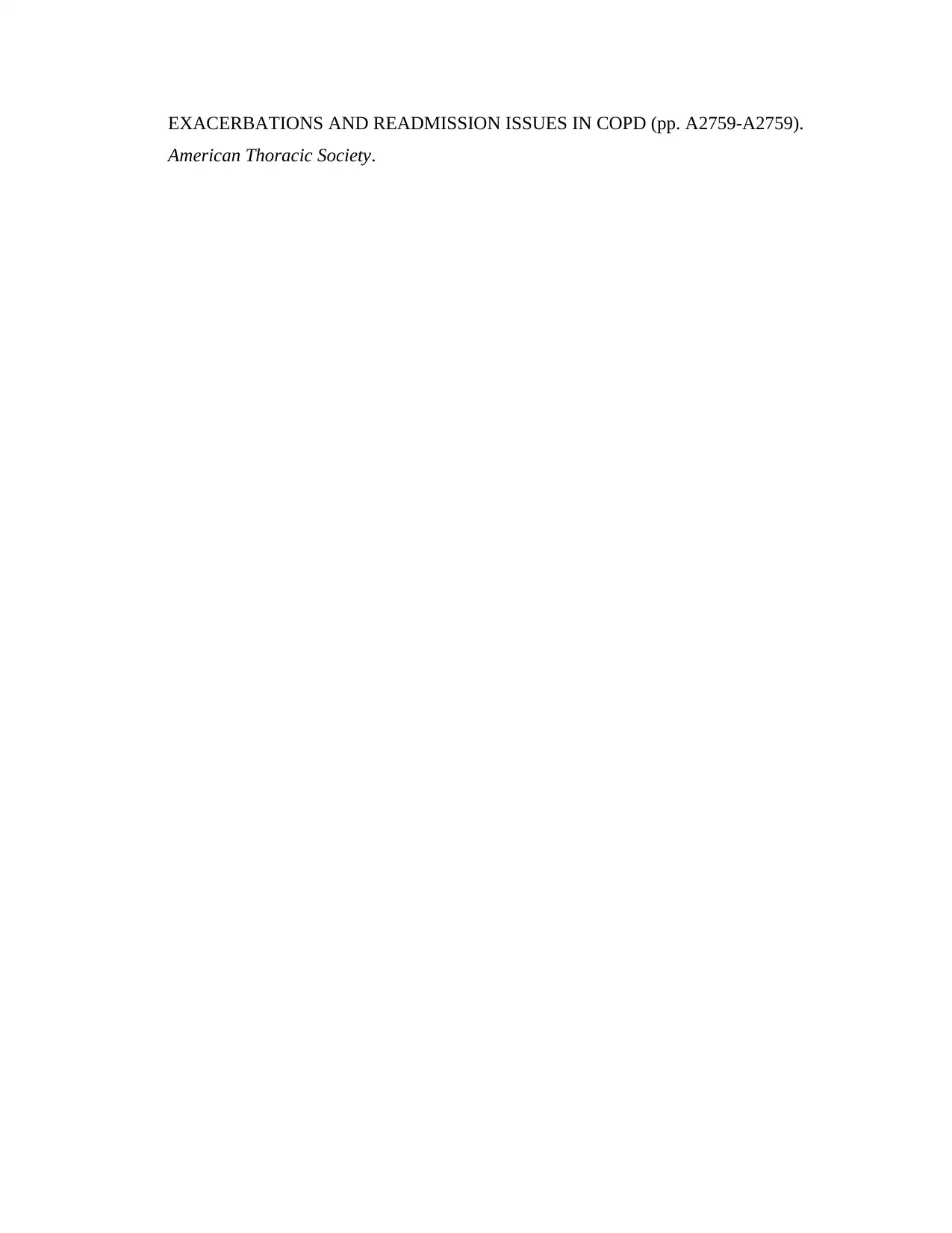
EXACERBATIONS AND READMISSION ISSUES IN COPD (pp. A2759-A2759).
American Thoracic Society.
American Thoracic Society.
⊘ This is a preview!⊘
Do you want full access?
Subscribe today to unlock all pages.

Trusted by 1+ million students worldwide
1 out of 6
Related Documents
Your All-in-One AI-Powered Toolkit for Academic Success.
+13062052269
info@desklib.com
Available 24*7 on WhatsApp / Email
![[object Object]](/_next/static/media/star-bottom.7253800d.svg)
Unlock your academic potential
Copyright © 2020–2026 A2Z Services. All Rights Reserved. Developed and managed by ZUCOL.





